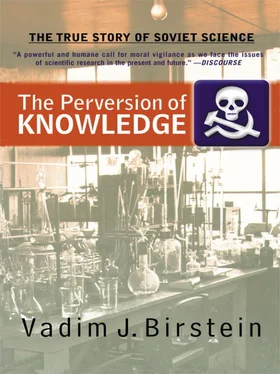As an officer, Rapoport became legendary within the troops for his courage and was nominated three times for the highest military award, Hero of the Soviet Union. He did not receive it, however, because he often confronted higher commanders whose behavior he considered cowardly or unethical. 408At the front, he joined the Communist Party. He defended his dissertation when he visited Moscow for a few days in 1943. He returned to the front even after he was wounded and lost his left eye.
In 1958, academician and Nobel laureate Nikolai Semenov organized the Department of Chemical Mutagenesis in his Academy Institute of Chemical Physics. Semenov, like Gleb Frank, was a typical prominent Soviet scientist who basically followed the demands of the regime. 409But despite his successful career and conformism, Semenov also knew the dark side of Soviet science—during the 1940s–early 1950s he was falsely accused of plagiarism. 410Additionally, he was a personal lifelong friend of the courageous academician Kapitsa. 411Sometimes Semenov surprised his Party supervisors, and his inviting Rapoport to the institute was an example of this behavior. Rapoport was appointed head of the new Department of Chemical Mutagenesis only after an eight-month-long fight between Semenov and Party officials, who did not want this troubled geneticist to work in his field of expertise. 412
In 1963, Rapoport and the English geneticist Charlotte Auerbach were nominated for the Nobel Prize for their developments in chemical mutagenesis. The Science Department of the Central Committee told Rapoport the condition under which the USSR Academy of Sciences would support his nomination—an appeal to the Party condemning his behavior toward Lysenko and the August 1948 Session. Despite the intense pressure, Rapoport categorically refused to write such an appeal. Following the Central Committee instruction, academy officials wrote to the Nobel Prize Committee that they would not support Rapoport’s nomination. 413Probably, this was the only case when a Nobel Prize in science was not given to a nominee because of his professional and human integrity. In 1979, Rapoport received the official Soviet recognition. He was elected a corresponding member of the academy. The life of this remarkable person ended in 1990 in a traffic accident. Because Rapoport had only one eye, he did not notice a car when he was crossing the street.
Another Koltsov pupil, Vladimir Efroimson (1908–1989), also strongly opposed the August 1948 Session. His action had more severe consequences. He was arrested by the MGB. I have already mentioned Efroimson’s name above in connection with his first arrest in 1932, when the OGPU considered preparing a political case against Koltsov. After he was released from a labor camp in 1936, Efroimson worked until 1938 in Tashkent. 414On the basis of experiments with the silkworm, he wrote a fundamental monograph on the genetics of this insect. The monograph had already been submitted to the publishing house, but it was not published because Efroimson was a former political prisoner. He moved to the All-Ukrainian Station of Silkworm Breeding in the Ukraine. There he wrote a new version of the monograph Problems of Genetics, Selection, and Hybridization of the Silkworm . The book was not published again. Moreover, Efroimson was fired. In the summer of 1941, a few days before the outbreak of war, Efroimson managed to defend his candidate dissertation. 415
Efroimson served in the Red Army as an epidemiologist and a medical doctor from August 1941 until November 1945. He also volunteered for the military intelligence and took part in operations to capture German soldiers for interrogation. He knew exactly what would happen to him, a Jew and a Soviet officer, if he was caught by the Nazis. But German was his second language (he had graduated from Moscow German School), and he believed that because of his excellent German, it was his duty to be involved in intelligence.
At the August 1948 Session, Efroimson did not try to confront the Lysenkoists. As he usually explained, his wife (who was also a geneticist) had forbidden him to do so. She was too frightened by Lysenko’s triumph. Yet Efroimson did act in his own eccentric way. After the session, he sent a written analysis of Lysenko’s activity to the Science Department of the Communist Party Central Committee. Efroimson’s second arrest by the MGB was the only response of Party officials to his letter.
When he was arrested in 1949, Efroimson was officially accused of “slandering the Soviet Army.” In 1945, he wrote a report to army headquarters about having witnessed atrocities by Soviet soldiers against German civilians. I remember Efroimson’s vivid description of a small German town after the conquest by the Red Army. Efroimson could not forget, for the rest of his life, how during the first night after the conquest, German women secretly sneaked out of town with young girls in an attempt to protect them from multiple rapes by Soviet soldiers. 416But this was in 1945, and Efroimson’s revolt against the atrocities had nothing to do with his letter against Lysenko in 1949 when he was taken to the MGB headquarters at Lubyanka Prison.
In fact, Efroimson was arrested because of his openly anti-Lysenkoist position. During the investigation, he even tried a hunger strike to force the MGB interrogator to change the accusation to the real anti-Lysenkoist issue. Finally, Efroimson was condemned to seven years’ imprisonment in a labor camp, which he spent in the terrible Dzhezkazgan camps in Kazakhstan. Like prisoners of the Nazi camps, the inmates of Dzhezkazgan Special Camps had numbers on their clothes. “The numbers were painted on by prisoners with brushes and pots of black paint,” the American Alexander Dolgun, who was in the same barrack with Efroimson, recalled later. 417
After his release, even before he was rehabilitated in 1956, Efroimson wrote again from scratch his huge anti-Lysenko report, “On the Undermining of Soviet Agriculture and the International Prestige of Soviet Science.” The first version of this manuscript had been confiscated during his arrest in 1949. Efroimson sent it now not to the Central Committee but to the USSR Chief Prosecutor’s Office. 418The biologist Zhores Medvedev, who in the 1960s wrote the first book on Lysenko and his crimes, The Rise and Fall of T. D. Lysenko, used this material for his research. Medvedev’s book appeared as a samizdat (self-published) manuscript in Russian and was disseminated among scientists in 1962. The English version was published by Columbia University Press in 1969. There was no answer from the prosecutors, and Efroimson published several anti-Lysenko articles in different scientific journals. This was very difficult to do because of Lysenko’s still overwhelming power in Soviet biology. Not only Efroimson but the editors of the journals as well needed great courage to publish such papers.
After Efroimson was released from the labor camp and returned to Moscow, as a former political prisoner he could not find a professional job as a geneticist. After terms in labor camps, former convicts accused of political crimes under Article 58 of the Russian Criminal Code needed to submit an appeal to the Prosecutor’s Office for rehabilitation. Before being rehabilitated, former political prisoners were treated as criminals who had been convicted of real crimes. As such, former convicted scientists, of course, could not find a job as scientists or publish their scientific papers. Despite this, Efroimson was accepted at the newly opened Library of Foreign Literature. The director of this library, Margarita Rudomino, was a unique person. She managed to give jobs to many former political prisoners, which was not appreciated by Party officials. In 1961, working as a bibliographer, Efroimson wrote the first book in Russian on medical genetics, Introduction to Medical Genetics . It was published in 1964 only after the energetic intervention of Academician Vasilii Parin and physicist Academician Axel Berg on behalf of the book. 419
Читать дальше











